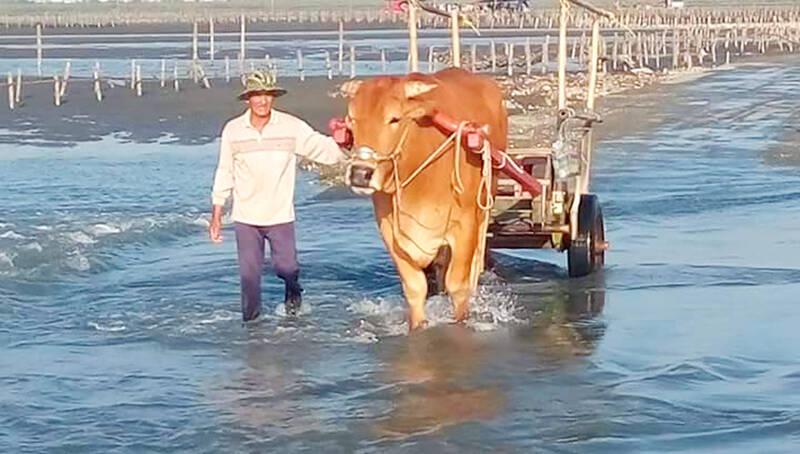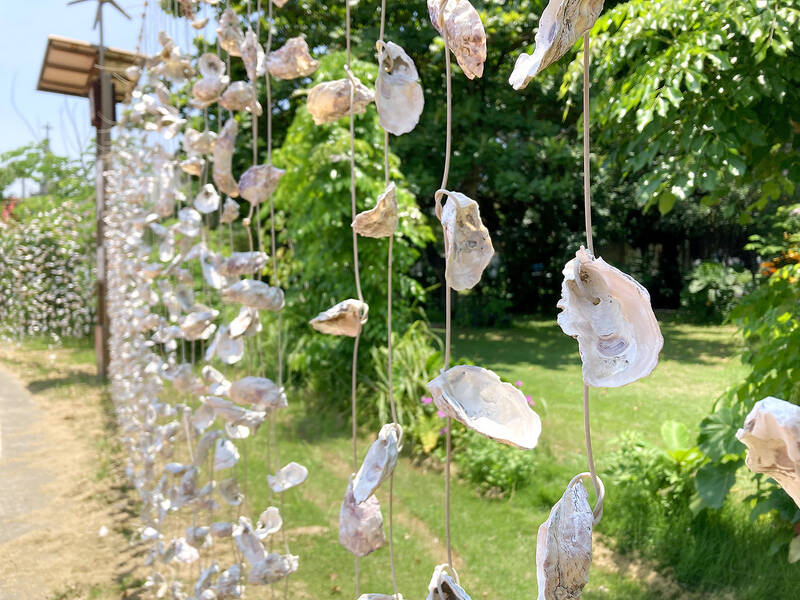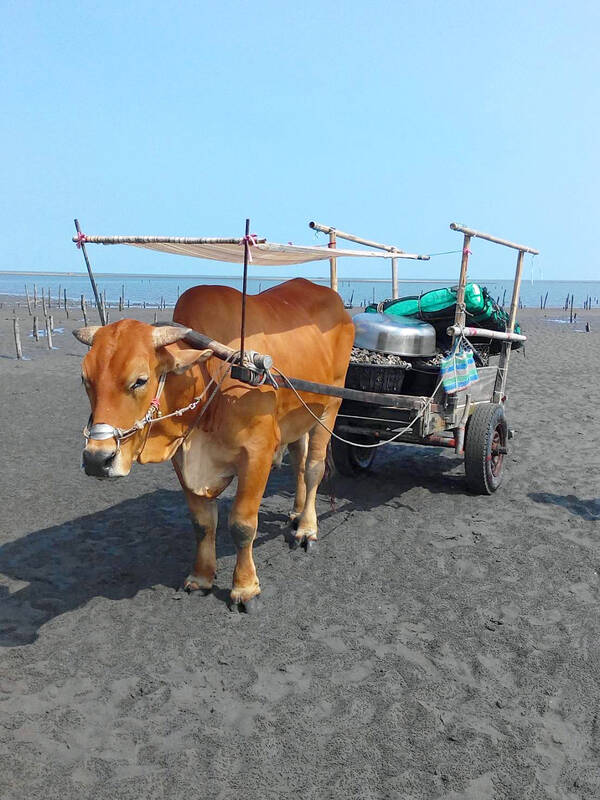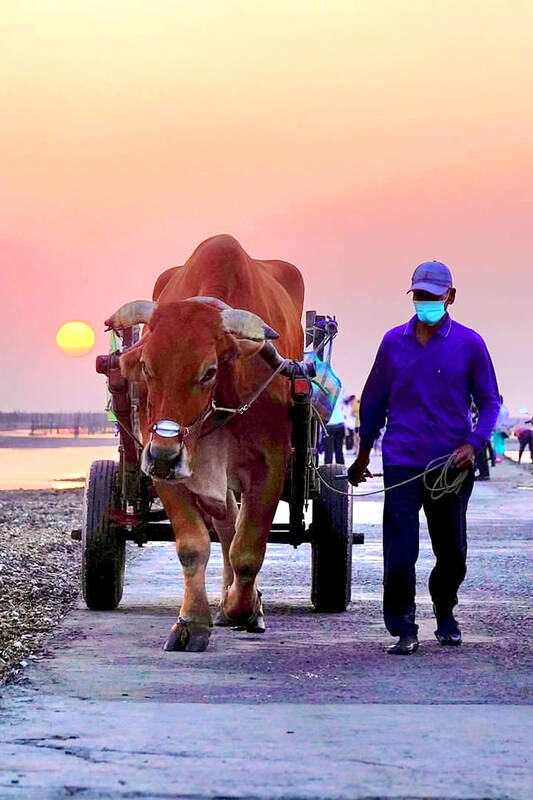In Changhua County’s coastal village of Fangyuan (芳苑), “ocean oxen” (海牛) are trained to help harvest oysters, which is the dominant economy of the village. However, in recent years their numbers have decreased significantly.
“Fangyuan would not be Fangyuan without ocean oxen,” says Hung Wu-hsiung (洪武雄), an elderly ocean oxen trainer.
Although their numbers are diminishing, locals are working hard to preserve their culture, which dates back to the Qing Dynasty, when Fangyuan was a bustling port town.

Photo courtesy of Hong Yan-chao
“Back in Fangyuan’s heyday, we were Lukang’s second port, and we had over 400 ocean oxen,” says Wu Wei-cheng (吳偉誠), principal of Fangyuan Elementary School (芳苑國民小學).
But today, Fangyuan’s population has shrunk dramatically, and there are only eight of the bovines left.
Ocean oxen are not a specific breed. They are trained to walk into the ocean, wait as oyster farmers load up their haul and then bring the cart back home. The large lumbering creatures learn the route from their home to the oyster field, so harvesters do not need to direct their oxen where to go.

Photo: Charles DeBenedetto, Taipei Times
Training an ocean ox can take years.
“Some are well-behaved and easy to train,” Hung says, “while others are troublemakers.”
A DIMINISHING CULTURE

Photo courtesy of Hong Yan-chao
Although some elderly residents still use ocean oxen, most of the harvesters today use machines because they are more efficient.
“It takes about four hours to harvest oysters with an ocean ox,” Hung says. “But machines can work twice as fast. Also, they don’t need rest.”
But some local residents, like Wei Ching-shuei (魏清水), leader of the Fangyuan Ocean Oxen Culture Association (芳苑海牛文化協會), are working hard to keep the culture alive.

Photo courtesy of Chen Hong-yun
His association conducts ocean oxen tours, where guests can ride in an ox-cart and collect oysters and clams to grill. Several other ocean oxen owners also conduct similar tours.
Wei says he’s trying to get the Fangyuan ocean oxen to be approved as a UNESCO World Heritage — an effort that the community hopes will bring new interest in this culture to Fangyuan’s youth, so they will carry on the tradition.
UNCERTAIN FUTURE
But success is far from certain.
Despite the modest growth of the ocean oxen tours, it is unclear if this tradition will survive.
“If people come, then our culture will not disappear,” says Huang Kuan-chang (黃冠彰), director of general affairs at Fangyuan Elementary School.
“Fangyuan cannot lose our ocean oxen,” Hung says.
In 2018, the school published a student-created picture book called Ocean Oxen’s Home (海牛的家鄉), which contains stories about all of the current ocean oxen owners.
“In the end, our ocean oxen will almost certainly disappear. But the most important thing is to remember that they were here,” Wu says.
TOUR INFORMATION
For information about ocean oxen tours visit the Changhua County Tourism Bureau’s English-language Web site: shorturl.at/ioBC1
Tours are conducted in Mandarin, are family friendly and will only depart at low tide. Because low-tide occurs at different times throughout the year, it is recommended to call in advance to confirm the departure time. Tours usually last about 2-3 hours. Although some tour guides speak English, it is recommended that at least one person in your party speak Mandarin in order to translate if necessary.
Hung Yan-chao also offers tours. Tel: (0953) 911-378.
Participants are encouraged to bring water, sunglasses and UV-protection clothing.

Growing up in a rural, religious community in western Canada, Kyle McCarthy loved hockey, but once he came out at 19, he quit, convinced being openly gay and an active player was untenable. So the 32-year-old says he is “very surprised” by the runaway success of Heated Rivalry, a Canadian-made series about the romance between two closeted gay players in a sport that has historically made gay men feel unwelcome. Ben Baby, the 43-year-old commissioner of the Toronto Gay Hockey Association (TGHA), calls the success of the show — which has catapulted its young lead actors to stardom -- “shocking,” and says

The 2018 nine-in-one local elections were a wild ride that no one saw coming. Entering that year, the Chinese Nationalist Party (KMT) was demoralized and in disarray — and fearing an existential crisis. By the end of the year, the party was riding high and swept most of the country in a landslide, including toppling the Democratic Progressive Party (DPP) in their Kaohsiung stronghold. Could something like that happen again on the DPP side in this year’s nine-in-one elections? The short answer is not exactly; the conditions were very specific. However, it does illustrate how swiftly every assumption early in an

Inside an ordinary-looking townhouse on a narrow road in central Kaohsiung, Tsai A-li (蔡阿李) raised her three children alone for 15 years. As far as the children knew, their father was away working in the US. They were kept in the dark for as long as possible by their mother, for the truth was perhaps too sad and unjust for their young minds to bear. The family home of White Terror victim Ko Chi-hua (柯旗化) is now open to the public. Admission is free and it is just a short walk from the Kaohsiung train station. Walk two blocks south along Jhongshan

Francis William White, an Englishman who late in the 1860s served as Commissioner of the Imperial Customs Service in Tainan, published the tale of a jaunt he took one winter in 1868: A visit to the interior of south Formosa (1870). White’s journey took him into the mountains, where he mused on the difficult terrain and the ease with which his little group could be ambushed in the crags and dense vegetation. At one point he stays at the house of a local near a stream on the border of indigenous territory: “Their matchlocks, which were kept in excellent order,